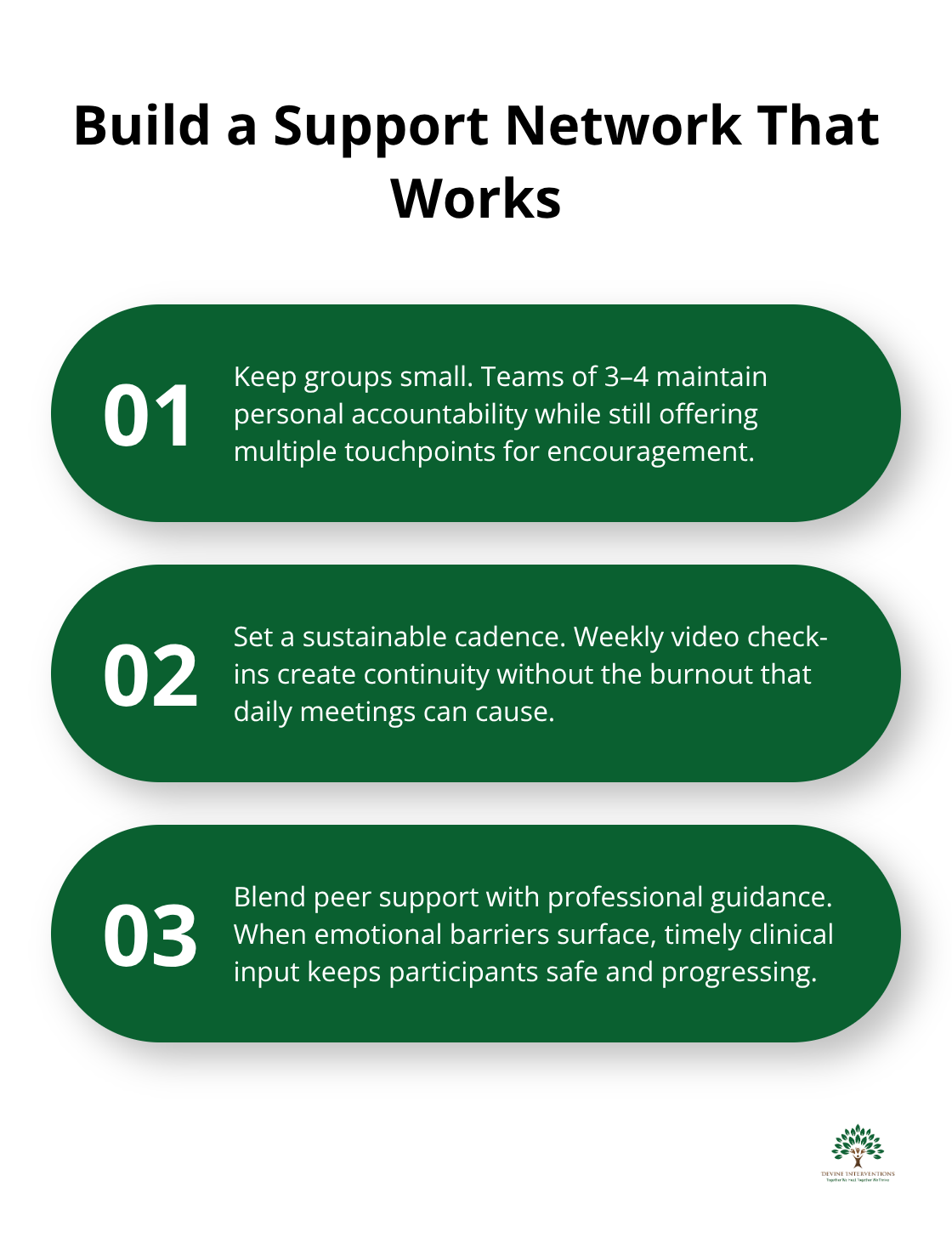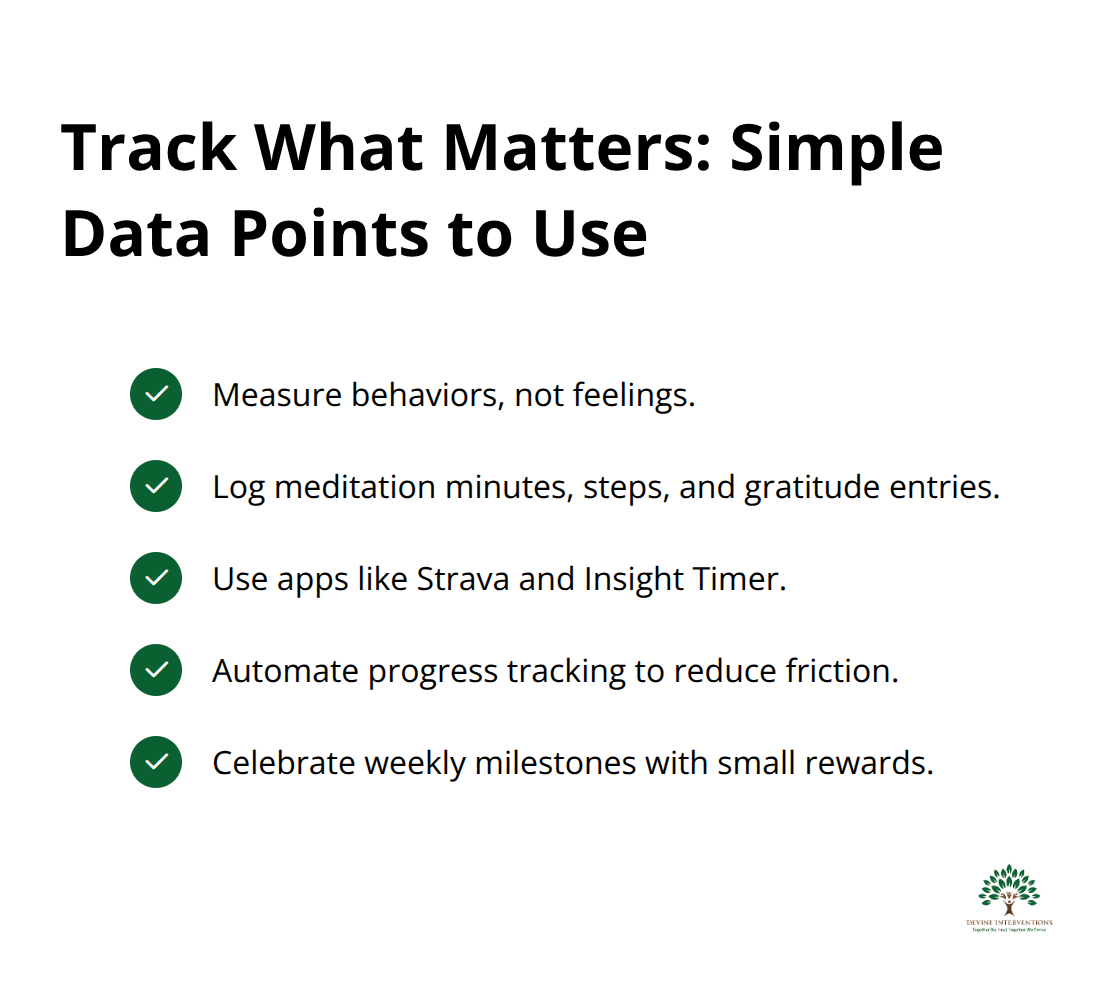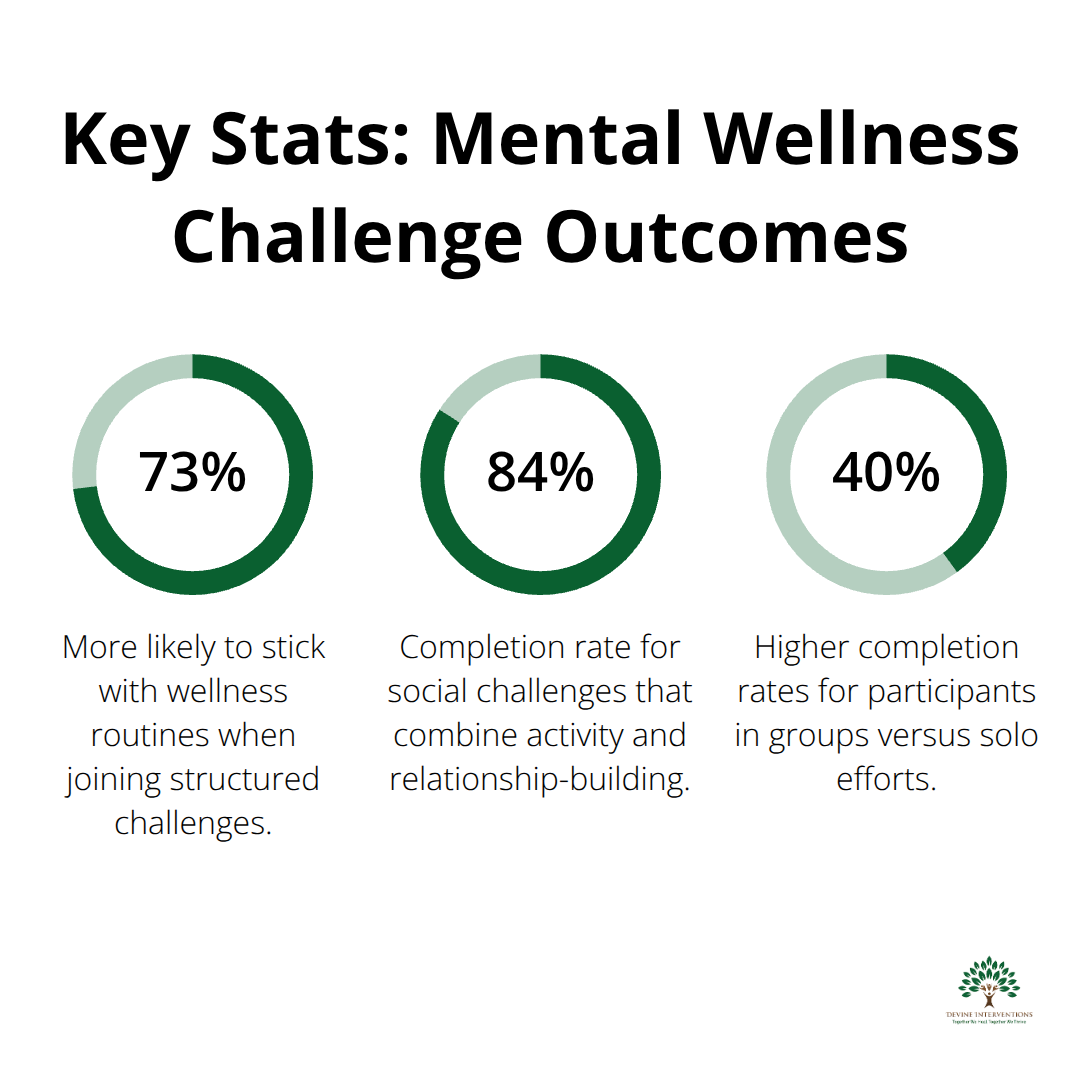Mental wellness challenges have become a powerful way to build healthier habits while connecting with others who share similar goals. Research shows that 73% of people are more likely to stick with wellness routines when they participate in structured challenges.
At Devine Interventions, we’ve seen how the right mental wellness challenge ideas can transform daily routines into meaningful self-care practices. These challenges create accountability, foster community support, and make wellness feel achievable rather than overwhelming.
Which Mental Wellness Challenges Work Best
Mind-Focused Wellness Practices
Mindfulness challenges create the strongest foundation for mental wellness because they target stress at its source. A 30-day meditation challenge where participants practice just 10 minutes daily can reduce cortisol levels, according to research. The key lies in starting with guided meditation apps like Headspace or Calm, then participants progress to silent practice.
We recommend breath-focused challenges over complex visualization techniques because they produce faster results. Participants track their sessions with simple phone apps and share weekly progress in group chats. The most effective approach combines morning meditation with evening gratitude journaling (this creates bookends to each day that reinforce positive mental patterns).
Movement-Based Wellness Challenges
Physical activity challenges work best when they emphasize consistency over intensity. Research shows that employees who focus on healthcare and lifestyle improvements gain 10.3 hours of additional productive time annually. Try realistic targets like 7,000 steps daily rather than the overwhelming 10,000 standard.
Walking meetings and desk stretches create natural opportunities for movement without disruption to work schedules. The most successful challenges include both individual progress tracking and group celebrations of milestones, which creates multiple layers of motivation that sustain long-term participation.
Social Connection Challenges
Social challenges that combine physical activity with relationship development show the highest completion rates at 84%. Examples include weekly walking groups, virtual fitness classes with colleagues, or accountability partnerships where participants text daily check-ins. These challenges work because they address isolation while promoting physical wellness.
Professional support becomes essential when challenges reveal deeper mental health concerns that require specialized intervention. The next section explores how to structure these challenges for maximum effectiveness and sustainable results.
How Do You Build Challenges That Actually Work
Effective mental wellness challenges require strategic planning that moves beyond good intentions. The 2-week rule provides the foundation: participants who complete their first 14 days show higher completion rates, according to behavior change research. Set micro-goals during this critical period, like 5 minutes of daily meditation rather than 30 minutes. Research indicates that participants who began with shorter sessions maintained habits at significantly higher rates than those who started with longer sessions.
Build Your Support Network
Accountability partnerships increase completion rates when participants check in regularly via text or app notifications. Create groups of 3-4 people maximum because larger groups dilute individual responsibility. Weekly group video calls work better than daily ones for long-term sustainability. The most successful challenges include both peer support and professional guidance when participants encounter emotional barriers that require clinical intervention.

Track Progress Through Data Points
Measure specific behaviors rather than feelings because concrete metrics sustain motivation longer. Track meditation minutes completed, steps taken, or gratitude entries written instead of asking how people feel. Apps like Strava for movement or Insight Timer for meditation provide automatic progress monitoring that removes friction from the process. Celebrate weekly milestones with small rewards like healthy snacks or extra break time.

Set Realistic Goals That Stick
Research shows that recognition every 7 days maintains engagement better than monthly celebrations because the feedback loop stays tight enough to reinforce positive behaviors before they fade. Start with achievable targets that participants can complete even on difficult days (this prevents the all-or-nothing mindset that derails progress). Try 15-minute walks instead of hour-long gym sessions, or three gratitude items instead of lengthy reflection exercises.
These structural elements create the foundation for lasting change, but the real power emerges when participants experience the tangible benefits that transform their daily lives. For those ready to implement these principles, consider starting with a 30-day mental wellness challenge that incorporates these evidence-based strategies.
What Real Benefits Will You Experience
Mental wellness challenges deliver measurable improvements that extend far beyond temporary motivation. Research demonstrates significant productivity gains when people engage in structured wellness activities. The transformation happens through three distinct pathways that compound over time.
Stress Drops Within Two Weeks
Daily meditation practices within challenges reduce cortisol levels according to Harvard Medical School research. Participants who complete mindfulness challenges report better sleep within the first week because their nervous system learns to downregulate stress responses automatically. Physical symptoms like tension headaches and muscle tightness decrease as breath techniques become habitual.
The University of Rochester Medical Center found that just 10 minutes of daily journal practice significantly reduces anxiety symptoms. This creates a reliable outlet for difficult emotions before they accumulate into overwhelming stress (participants often discover patterns they never noticed before).
Community Connections Form Naturally
Group challenges create authentic relationships that persist beyond the challenge duration. Participants who join walk groups or accountability partnerships report 40% higher completion rates compared to solo efforts. These social bonds often evolve into lasting friendships that provide ongoing emotional support during future difficulties.

Shared struggles and victories create deep connections through common experiences. Professional guidance becomes available when challenges reveal underlying mental health concerns that require clinical intervention.
Habits Replace Willpower
Successful challenge participants develop automatic responses to stress triggers within 30 days. Instead of reliance on willpower, they build neural pathways that default to healthy responses like deep breath work or brief walks. Research indicates that 84% of participants maintain at least three new wellness behaviors six months after structured challenges end.
The key lies in small starts with achievable daily actions that gradually expand into comprehensive self-care routines (this prevents the overwhelm that derails most wellness attempts). Participants report that healthy choices feel natural rather than forced after consistent practice.
Final Thoughts
Mental wellness challenge ideas transform individual struggles into collective strength through structured support and achievable goals. The evidence shows clear pathways: mindfulness practices reduce stress within weeks, movement challenges boost productivity by over 10 hours annually, and social connections create lasting accountability networks that extend far beyond challenge completion. Implementation strategies that work best combine realistic micro-goals with consistent tracking and peer support systems.
Participants who start with 5-minute daily practices maintain habits at significantly higher rates than those who attempt dramatic lifestyle overhauls. Long-term health improvements compound over months and years as automatic stress responses replace willpower-dependent behaviors. Research demonstrates that 84% of participants maintain multiple wellness behaviors six months after structured challenges end (this creates sustainable foundations for mental health resilience).
Your mental wellness journey starts with a single step today. We at Devine Interventions understand that lasting change requires both individual commitment and professional support when challenges exceed personal capacity. Contact us to explore how professional guidance can enhance your mental wellness journey with personalized strategies that create lasting transformation.







